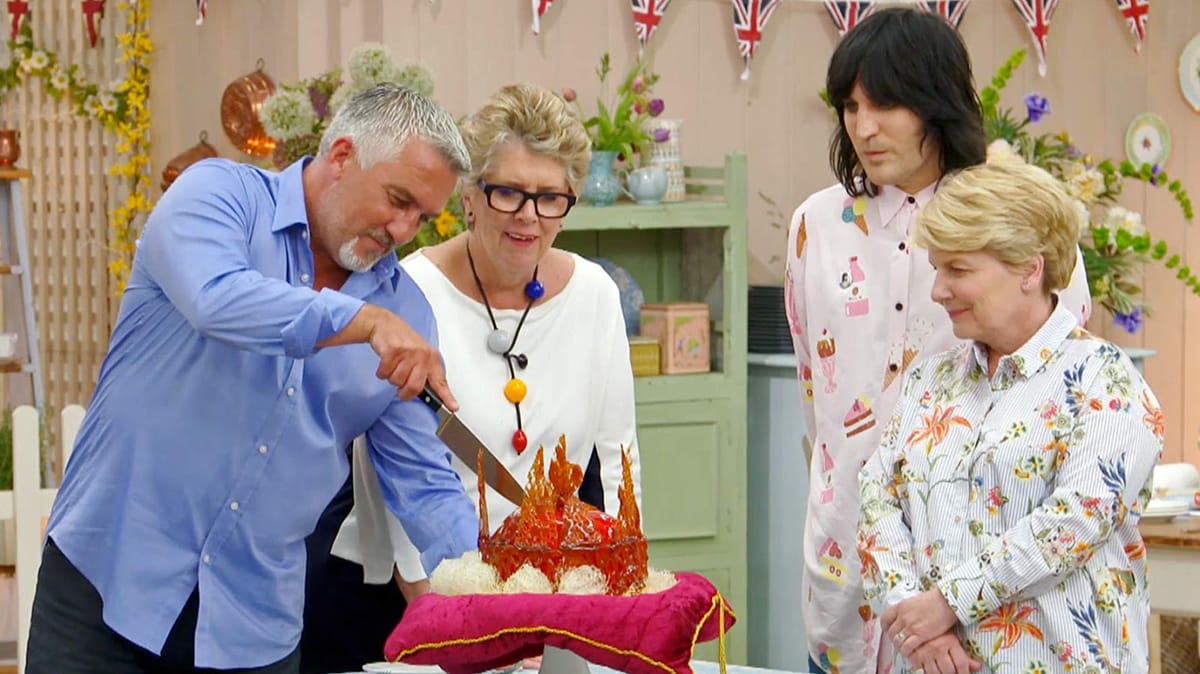The Comforting Charm of “The Great British Baking Show”

For years, I was confused as to why so many people loved “The Great British Baking Show.” It has none of the elements of the typical American competitive reality TV show — there is no tension between contestants, no surprise challenge element and no significant monetary reward. So last fall, I decided to finally watch it, and I got it. What it lacks is exactly what makes it great. The contestants and the judges are there for the baking, and so are we, the audience.
It is what we all need for a rainy day, like a knitted sweater for our emotionally-taxed souls. That being said, judgmental looks from the show’s celebrity chef judge, Paul Hollywood, give the show that bit of snark it cannot function without.
For fans, it’s been a long year without new episodes of TGBBS to warm hearts and grace television screens. But at last, the wait is over! Netflix has come to the rescue (once again) and has brought the latest season, with new episodes premiering every Friday — the perfect time to close off a week of work.
In the unique heartfelt way that only TGBBS can pull off, the first two episodes of this new season create a spectacle of cakes and cookies, or biscuits, as the British would say. Unfortunately, part of that spectacle included some epic fails, because, as viewers and constants alike hear time after time, it is a lot harder to bake inside a tent than in a kitchen.
From overbaked cakes to terribly flavored cookies and messy decorations, some of the bakers have struggled to keep up with the high standards of Prue and Paul (the show’s alliterative judging team, made up of Prue Leith and Hollywood).
Still, in the midst of chaos, the show gives us a reminder of what makes it so lovable. When a few bakers struggle to complete their recipes, those who have don’t hesitate to fall in line to help fellow competitors. Everyone seems to have the mindset that good results for everybody is much better than letting others fail while some thrive. And with one baker already sent home after cake week, mutual support only intensifies when it comes to the biscuits.
Two weeks in, standouts are already emerging for the title. There’s Henry Bird, with his attention to detail and intricate work; Michelle Evans-Fecci, with seemingly-natural talent for perfection; Alice Fevronia, with her knack for adorably-delicious bakes, like her coconut-lime, lamb-shaped biscuits; and Rosie Brandreth-Poynter, who is celebrated for the flavors in her baked goods.
Even for those whose baked goods do not stand out with the judges, the show is able to develop their on-screen characters, giving windows into the people behind the biscuits and cakes.
Helena Garcia, who is in love with Halloween, can definitely be expected to bring in a creepy element to all of her creations. Alice Fevronia appears to have stepped right out of a Disney movie, with birds chirping with joy at her every word. Jamie Finn is perpetually working in a mess, and his decorations show it, but he never fails to bring the enthusiasm that only a 20-year-old can have. David Atherton, true to his profession as an international health adviser, brings healthy ingredients to his recipes. Amelia Le Bruin’s pink hair and background in the fashion industry easily illustrate her inclination towards creativity.
Of course, out of everyone in the tent, it is the hosts, Noel Fielding and Sandi Toksvig, who steal the show with their absurd sense of humor. What would this show be without the semi-awkward hosts to relieve the bakers’ pressure?
It is the personalities of the hosts, judges and bakers combined, though, that really make “The Great British Baking Show” as — to take Hollywood’s word — “superb” as it is.




Comments ()